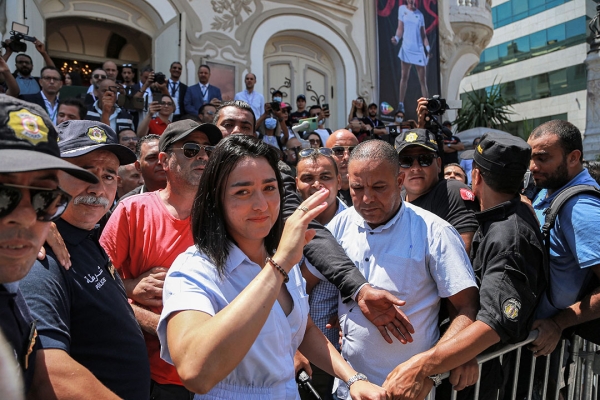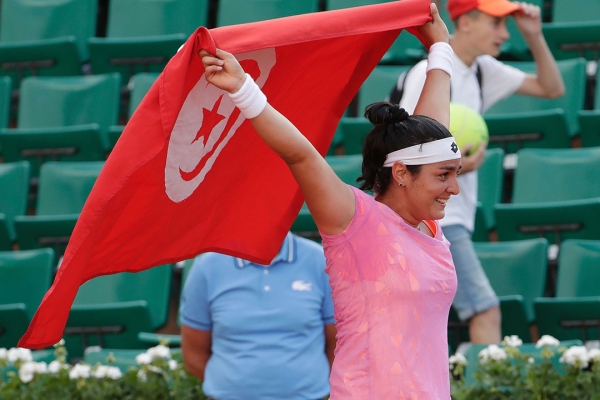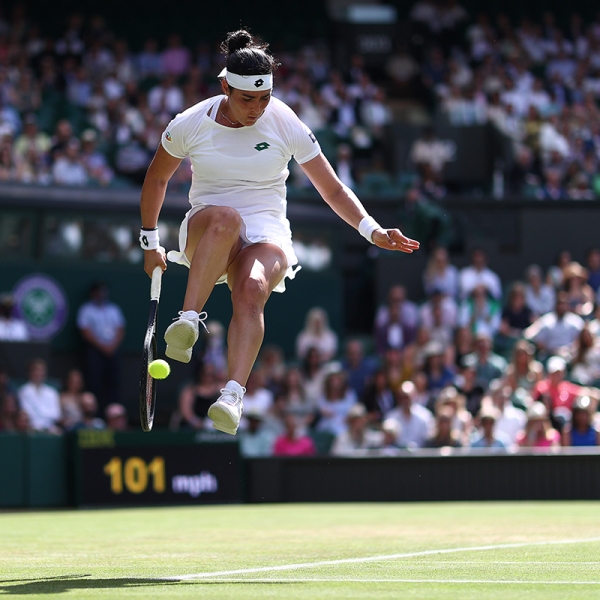A version of this article first appeared in the August/September 2022 issue of Australian Tennis Magazine, one of the world’s longest-running tennis publications. For more in-depth features, news and analysis, you can subscribe now.
Ons Jabeur looked shattered in her courtside chair moments after her three-set loss to Elena Rybakina in the Wimbledon final.
But this seemed a temporary state, given the energy she exuded just two hours later in her post-match press conference.
“It's a great first experience for me. I'm looking forward for my next finals. I'm sure I will learn a lot from this one,” the Tunisian said.
“I'm very glad with my results. I don't regret anything. I gave it all. I don't disbelieve in myself and I know that I'm going to come back and win a Grand Slam.
"This is tennis, and it's part of it. But I'm very, very positive about it.”
She carried that positivity across the Atlantic, winning through to her second straight Grand Slam final at the US Open before being stopped by the irrepressible Iga Swiatek.
RELATED: Swiatek cements greatness with third major title at US Open
“The most important thing is accepting it, learning from the finals that I lost. Definitely I'm not someone to give up. I will try my best to win it. I'm not sure, but I know I will do my best," Jabeur said.
“I'll be evolving for sure. I'm going to keep my hopes up. I know there is a lot of finals coming for me.”
Arab inspiration
At Wimbledon and the US Open, as she always has, Jabeur was playing for more than just herself and her team – a predominantly all-Tunisian entourage of which she is fiercely proud.
She competed for her compatriots, plus the North African region and the Arab world, global segments persistently under-represented in professional tennis.
The impact of her achievements was obvious from the reception that followed them.
Tunisian flags could be spotted everywhere throughout the crowd at Arthur Ashe Stadium on US Open women's final day, while fans at the All England Club celebrated a level below where she was conducting post-final TV interviews on the media terrace. After Wimbledon she returned home to much fanfare in the nation's capital Tunis; fans gathered outside the city’s Municipal Theatre, and she was awarded Tunisia’s Great Medal of the National Order of Merit at the Presidential Palace.

At Wimbledon Jabeur became the first Arab to ever win a Grand Slam quarterfinal after beating Marie Bouzkova, following 11 losses for Arabs at that stage of a major tournament. More notably, she was the first Arab woman to ever enter this conversation, discussion she extended by progressing to the final.
Yet after winning the opening set, her game dropped away, allowing Rybakina space to impose herself. Instead of a Tunisian fairytale, Rybakina triumphed 3-6 6-2 6-2, the first Kazakh to ever hoist a major singles trophy.
“I know a lot of Muslims, during me playing, wished me a happy Eid. Even when I was serving it was like, ‘Happy Eid’. It was really amazing,” said Jabeur, whose Wimbledon final coincided with Eid al-Adha, a religious celebration throughout the Muslim world.
You're a champion for so many, @Ons_Jabeur ? ??#Wimbledon | #CentreCourt100 pic.twitter.com/ArMGzlBFH0
— Wimbledon (@Wimbledon) July 9, 2022
“It's always about Tunisia somehow. I want to go bigger, inspire many more generations. Tunisia is connected to the African continent. It's not like Europe or any other countries. I want to see more players from my country, from the Middle East, from Africa.
“I think we didn't believe enough at certain points that we can do it. Now I'm just trying to show that (we can). Hopefully people are getting inspired.”
Jabeur’s performance concluded a commanding three-month run featuring titles in Madrid and Berlin, finals at Charleston and Wimbledon, and a win-loss record of 28-5.
In early April she was ranked 10th, but now, at age 28, she sits at a career-high mark of world No.2.
Rise to the top
Slow yet steady progress has defined this late-bloomer’s career, despite her own prodigious talent.
She won the Roland Garros junior title in 2011, but it was not until six years later, at the same venue, that she won her first professional Grand Slam main-draw match.
Jabeur upset sixth seed Dominika Cibulkova that year in Paris to reach the third round, a result providing the enduring image of Jabeur celebrating excitedly on Court Suzanne Lenglen with a Tunisian flag handed to her by supporters.

Jabeur soon cracked the world’s top 100, yet stagnated until closing the 2018 season with her first WTA final in Moscow, which pushed her just inside the top 60 – where she remained for the rest of 2019.
It was at Australian Open 2020 where she took a more resounding step, beating three former top-five players in Johanna Konta, Caroline Garcia and Caroline Wozniacki to become the first Arab woman to reach the last 16 of a major, a result she bettered by advancing to the quarterfinals.
The COVID-19 pandemic soon struck, but Jabeur had proven she could be a legitimate force at the top of the game.
Season 2021 delivered a maiden WTA title at Birmingham, and a first Wimbledon quarterfinal. And she ended it inside the top 10 – the first Arab player, male or female, to ever reach this bracket – after beginning outside the top 30.
ONS JABEUR: Top 10 "just the beginning of great things"
“Such an inspiration pushing Arab and African tennis players to reach what seemed unreachable!” tweeted Mayar Sherif, the rising Egyptian star, in response to the news.
Stepping stones
After her Birmingham triumph, Jabeur lost two more WTA finals, slipping to 1-4 in title matches.
Her subsequent victory this May at the Madrid WTA 1000 tournament could therefore prove telling.
"I have the level to win, to be honest with you, any tournament. But sometimes, a few things are missing,” Jabeur told the WTA Insider podcast after beating Simona Halep, among others, en route to her biggest career title.
RELATED: The rise of Ons Jabeur
"Playing against (former world No.1 and major champion) Simona, I had to go through this step, through this test, to be able to achieve my dreams. I want to be in the top five, I want to win Grand Slams. And to be able to win Grand Slams, I think I have to go through a final like this – the second-biggest final after a Grand Slam.
“I cannot escape not doing this anymore. I had to go through this, I had to win against great players. I had to feel the stress of a final.
“And I think I'm going in the right path. I hope I am.”
Ticking these developmental boxes is an ongoing, yet non-linear, process.
Jabeur rode that Madrid momentum into the Rome final, where it took world No.1 Iga Swiatek to snap her 11-match winning streak. She then arrived at Roland Garros as the second title favourite behind the red-hot Pole, thanks to winning 17 of 20 clay-court season matches.
But just two-and-a-half hours after the tournament began, Jabeur was already out of it, shockingly eliminated by Magda Linette on the opening day.
“Going to the French Open, I really felt that pressure of everybody expecting me to do well. I wasn't used to that. Just (usually an) invisible player going to Grand Slams, doing well sometimes,” she smiled.
“But I tried to learn from that. I think the good thing is I keep positive, and I always say something bad happens, because there is a great thing coming.”
Variety and creativity
A universally accepted truth in tennis: with multiple strategies and weapons at hand, it takes longer to eventually understand how to effectively use them.
Jabeur waited 11 years to reach a major final after her junior Slam success, unlike other contemporary phenoms Eugenie Bouchard, Jelena Ostapenko, Coco Gauff and Swiatek, who quickly translated their junior results to the professional stage.
All showcased devastatingly effective power and game-plan clarity, but none matched Jabeur’s stylistic three-dimensionality.
Nicknamed the ‘Minister of Happiness’ in Tunisia, Jabeur’s game style and personality – reflected in the joy and freedom with which she plays – clearly also delivers joy to her growing fan base.

“I asked my coach, how did I start doing this, like the dropshot and everything? Maybe from watching a lot of TV before and picking up a few things. I'm not sure who I watched really, but I just started doing that on my own and he just supported it,” recalled Jabeur, who developed her game almost entirely in Tunisia.
“And I'm glad he did. I always say that it reflects a little bit my character, the fact that I change a little bit the rhythm and not liking routine much is kind of me on the court.
“I had to remind myself why did I start playing tennis, what kind of joy that tennis brings to me. As soon as I remind myself that, I get pumped, motivated to go, and play my next matches.”
Her imaginative shot-making and creativity have proved wonderfully effective on the game’s ‘natural’ surfaces of clay and grass.
And, given she continues refining this mix with increasing consistency, she has become a growing threat on hard courts – proven by her run to the US Open final.
“I really cannot wait to play my next tournaments, especially that I'm going to the States, and I know there is a lot of crazy fans there,” Jabeur said, prophetically, after the Wimbledon final.
“It's going to be amazing.”

Nick Kyrgios is the cover star of the August/September 2022 issue of Australian Tennis Magazine.